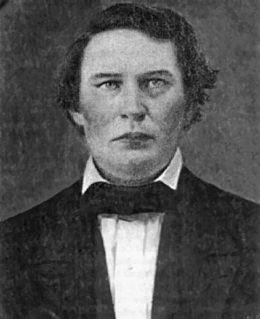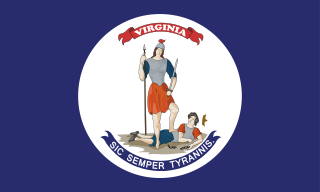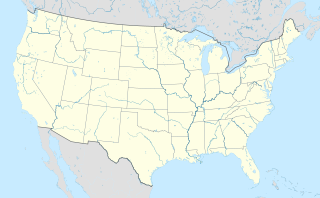
The Confederate States of America, commonly referred to as the Confederacy and the South, was an unrecognized country in North America that existed from 1861 to 1865. The Confederacy was originally formed by seven secessionist slave-holding states—South Carolina, Mississippi, Florida, Alabama, Georgia, Louisiana, and Texas—in the Lower South region of the United States, whose economy was heavily dependent upon agriculture, particularly cotton, and a plantation system that relied upon the labor of African-American slaves.

Three successive designs served as the official national flag of the Confederate States of America during its existence from 1861 to 1865.

The Confederate States Army (C.S.A.) was the military land force of the Confederate States of America (Confederacy) during the American Civil War (1861–1865), fighting against the United States forces. On February 28, 1861, the Provisional Confederate Congress established a provisional volunteer army and gave control over military operations and authority for mustering state forces and volunteers to the newly chosen Confederate president, Jefferson Davis. Davis was a graduate of the U.S. Military Academy, and colonel of a volunteer regiment during the Mexican–American War. He had also been a United States Senator from Mississippi and U.S. Secretary of War under President Franklin Pierce. On March 1, 1861, on behalf of the Confederate government, Davis assumed control of the military situation at Charleston, South Carolina, where South Carolina state militia besieged Fort Sumter in Charleston harbor, held by a small U.S. Army garrison. By March 1861, the Provisional Confederate Congress expanded the provisional forces and established a more permanent Confederate States Army.

Edmund Pettus was an American politician who represented Alabama in the United States Senate from 1897 to 1907. He previously served as a senior officer of the Confederate States Army who commanded infantry in the Western Theater of the American Civil War. After the war, he was politically active in the Ku Klux Klan, serving as a grand dragon.

William Calvin Oates was a colonel in the Confederate States Army during the American Civil War, the 29th Governor of Alabama from 1894 to 1896, and a brigadier general in the U.S. Army during the Spanish–American War.

The President of the Confederate States of America was the elected head of state and government of the Confederate States. The president also headed the executive branch of government and was commander-in-chief of the Army and Navy, and of the militia of the several states when called into Confederate service.

Thomas Howell Cobb was an American political figure. A southern Democrat, Cobb was a five-term member of the United States House of Representatives and Speaker of the House from 1849 to 1851. He also served as the 40th Governor of Georgia (1851–1853) and as a Secretary of the Treasury under President James Buchanan (1857–1860).

David P. Lewis was an American politician who served as the 23rd Governor of Alabama from 1872 to 1874. He was also a Deputy from Alabama to the Provisional Congress of the Confederate States, serving from February until April 1861, when he resigned from office.

Clement Claiborne Clay, also known as C. C. Clay, Jr., was a United States Senator (Democrat) from the state of Alabama from 1853 to 1861, and a Confederate States Senator from Alabama from 1862 to 1864. His portrait appeared on the Confederate one-dollar note.

James Lawrence Pugh was a U.S. senator from Alabama, as well as a member of the Confederate Congress during the American Civil War.

The Provisional Congress of the Confederate States, also known as the Provisional Congress of the Confederate States of America, was a congress of deputies and delegates called together from the Southern States which became the governing body of the Provisional Government of the Confederate States of America (CSA) from February 4, 1861, to February 17, 1862. It sat in Montgomery, Alabama, until May 20, 1861, when it adjourned to meet in Richmond, Virginia, on July 20, 1861. It added new members as other states seceded and directed the election on November 6, 1861, at which a permanent government was elected.

Samuel Cooper was a career United States Army staff officer, serving during the Second Seminole War and the Mexican–American War. Although little-known today, Cooper was also the highest-ranking Confederate general during the American Civil War. After the conflict, he remained in Virginia as a farmer.

Jackson Morton was an American politician. A member of the Whig Party, he represented Florida as a U.S. Senator from 1849 to 1855. He also served as a Deputy from Florida to the Provisional Congress of the Confederate States from 1861 to 1862.

Henry Cornelius Burnett was an American politician who served as a Confederate States Senator from Kentucky from 1862 to 1865. From 1855 to 1861, Burnett served four terms in the United States House of Representatives. A lawyer by profession, Burnett had held only one public office—circuit court clerk—before being elected to Congress. He represented Kentucky's 1st congressional district immediately prior to the Civil War. This district contained the entire Jackson Purchase region of the state, which was more sympathetic to the Confederate cause than any other area of Kentucky. Burnett promised the voters of his district that he would have President Abraham Lincoln arraigned for treason. Unionist newspaper editor George D. Prentice described Burnett as "a big, burly, loud-mouthed fellow who is forever raising points of order and objections, to embarrass the Republicans in the House".

George Washington Johnson was the first Confederate governor of Kentucky. A lawyer-turned-farmer from Scott County, Kentucky, Johnson favored secession as a means of preventing the Civil War, believing the Union and Confederacy would be forces of equal strength, each too wary to attack the other. As political sentiment in the Commonwealth took a decidedly Union turn following the elections of 1861, Johnson was instrumental in organizing a sovereignty convention in Russellville, Kentucky with the intent of "severing forever our connection with the Federal Government." The convention created a Confederate shadow government for the Commonwealth, and Johnson was elected its governor.

The State of Alabama was central to the Civil War, with the secession convention at Montgomery, birthplace of the Confederacy, inviting other states to form a Southern Republic, during January–March 1861, and develop constitutions to legally run their own affairs. The 1861 Alabama Constitution granted citizenship to current U.S. residents, but prohibited import duties (tariffs) on foreign goods, limited a standing military, and as a final issue, opposed emancipation by any nation, but urged protection of African slaves, with trial by jury, and reserved the power to regulate or prohibit the African slave trade. The secession convention invited all slaveholding states to secede, but only 7 Cotton States of the Lower South formed the Confederacy with Alabama, while the majority of slave states were in the Union and voted to make U.S. slavery permanent by passing the Corwin Amendment, signed by President Buchanan and backed by President Lincoln on March 4, 1861.

The Commonwealth of Virginia became a prominent part of the Confederate States of America when it joined the Confederacy during the American Civil War. As a Southern slave-holding state, Virginia held a state convention to deal with the secession crisis, and voted against secession on April 4, 1861. Opinion shifted after April 15, when U.S. President Abraham Lincoln called for troops from all states still in the Union to put down the rebellion, following the capture of Fort Sumter, and the Virginia convention voted to declare secession from the Union. A Unionist government was established in Wheeling and the new state of West Virginia was created by an act of Congress from 50 counties of western Virginia, making it the only state to lose territory as a consequence of the war.

Thomas Hardeman Jr. was an American politician, lawyer and soldier.
Benjamin M. Anderson was a partisan soldier for the Confederate States of America during the American Civil War. He had gained military experience while serving under William Walker's filibustering campaign in Nicaragua. During the Civil War he served under Thomas Hines during Hines' espionage efforts behind Northern lines. While jailed for his war activities in a Cincinnati, Ohio jail, he committed suicide by a self-inflicted gunshot to the head on February 19, 1865.
Marcus H. MacWillie was a politician who represented the Confederate Arizona Territory in the Congress of the Confederate States during the American Civil War.






















